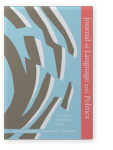Vol. 17:4 (2018) ► pp.533–551
‘Secularism’ as understood and interpreted by Hindu nationalists
This article focuses on how Hindu nationalists interpret the term ‘secularism’ in Hindi. I will refer to two Hindi translations of ‘secularism’: dharmnirpekṣtā and panthnirpekṣtā. The first one means indifference towards religion and the second indifference towards communities. My main point is that the Hindu nationalists’ strategy of referring to old, Sanskrit meanings of dharm (which means ‘law’ and ‘order’ aside ‘religion’ and other concepts) make it possible for them to criticise dharmnirpekṣtā and choose panthnirpekṣtā instead. Their position is that the state can only be indifferent to communities and not to dharm, as the latter would also mean being indifferent to ‘law’ and ‘order’. Such an approach helps the Hindu nationalists to claim to be in agreement with the idea of secular Indian state on one hand and promote their religion-linked ideology on the other.
Article outline
- 1.Introduction
- 2.Methods, sources, organisation of the text and the choice of the spelling
- 3.The context of Hindu nationalism
- 4.Hindu nationalists’ interpretations of secularism
- 4.1Secularism
- 4.2 Dharmnirpekṣtā
- 4.3 Panthnirpekṣtā
- 4.4 Sarvdharmsambhāv, sarvpanthsambhāv, sarvpanthsamādar
- 5.The political use of the terms for ‘secularism’ by Hindu nationalists
- 6.Conclusions
- Acknowledgments
-
References
